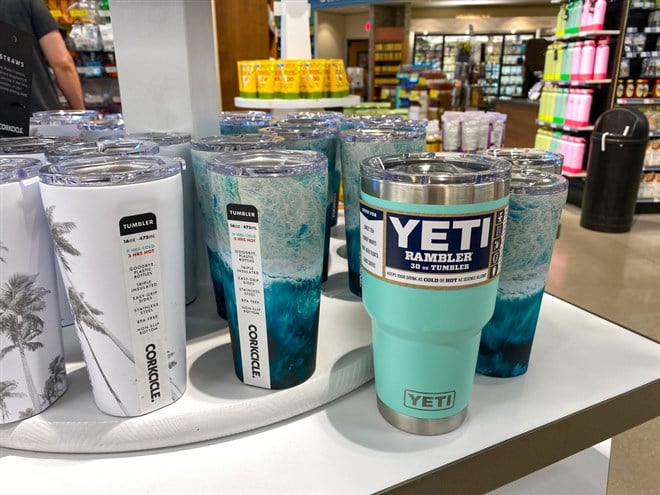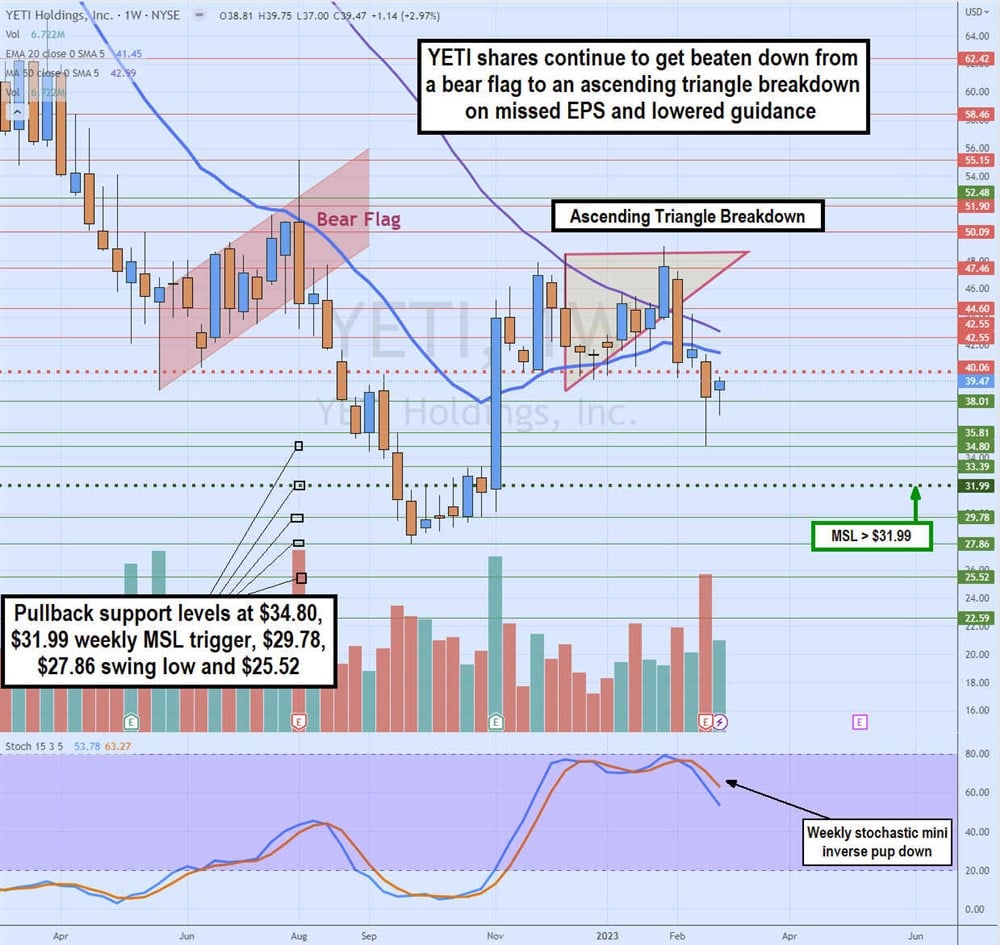
Durable outdoor products manufacturer Yeti Holdings, Inc. (NYSE: YETI) stock has struggled to hold gains as voluntary product recalls caused charges and sales disruption. The maker of trendy soft coolers, travel gear, and apparel experienced a substantial boost in sales during the pandemic as consumers ventured outdoors and adopted outdoor recreation and lifestyles.
The pandemic spawned an unprecedented surge in outdoor lifestyle brands like Columbia Sportswear Co. (NASDAQ: COLM) and recreational vehicle (RV) sales as reported by leading manufacturers, including Winnebago Industries Inc. (NYSE: WGO), Polaris Inc. (NYSE: PII) THOR Industries Inc. (NYSE: THO) and Camping World Holdings Inc. (NYSE: CWH).
Normalization and Recalls
However, the post-pandemic reopening, high inflation, and return to office have accelerated the normalization for the same pandemic winners. Yeti may not have been hit as hard as the RV makers, as their durable products can be used all year round. However, the company underwent a voluntary product recall on some of its coolers and bags, which cost them $129 million in Q4 2022.
The unsalable products in inventory on-hand were written off for ($34.1 million), and a reserve of $94.8 million was established for future product refunds, recall remedies, and recall-related costs.
On Feb. 23, 2023, Yeti released its fiscal fourth-quarter 2022 results for December 2022. The company reported an adjusted profit of $0.78 per share, missing consensus analyst estimates of $0.79 per share by $0.28 per share. Revenues grew 1.1% year-over-year (YoY) to $448 million, falling short of consensus analyst estimates of $492 million.
Adjusted sales, excluding voluntary, recalls impacts of $38.4 million, were up 10% to $486.4 million. Direct-to-consumer (DTC) sales rose 17% to $309.5 and up 20% to $315.7 million, excluding recall impacts.
Wholesale channel sales fell (23%) due to the ($32.2 million) unfavorable impact of the voluntary recalls. Net loss, including the voluntary recall, was ($27.7 million), compared to net income of $72.9 million in the year-ago period. Net loss per diluted share was (-$0.32) versus net income of $0.82 in the year-ago period. The company ended 2022 with $234.7 million and completed its $100 million share buyback, repurchasing 1.7 million shares.
CEO Paints a Bullish Narrative
Yeti CEO Matt Reintjes commented, “Importantly, gross margins headwinds began easing during the fourth quarter as we expected, with year-over-year levels expected to turn positive and gain momentum as we move into the upcoming quarters.” He felt the voluntary recalls were the right decision for its premium brand underscoring its commitment to quality, performance, durability, and design.
Normalization Clamping Down
The gross profit margin was 16.8% down (-300 bps). Net income fell (-39.6%) to $60.2 million as adjusted EPS fell (-41%) to $2.07 from $3.51 in the year-ago period. The Towable segment fell (-46.7%) to $347.3 million. Backlog fell (-76.9%) to $34 million. On a bright note, Motorhome sales grew 10.1% YoY to $464.2 million, primarily due to price increases. Marine segment revenues climbed 65.7% to $131.4 million on unit volume and price increase. The company has total outstanding debt of $590.4 million and $617.7 million in working capital and generated $29.9 million in cash flow from operations in the quarter.
Analyst Reactions
Goldman Sachs downgraded shares of Yeti to Neutral with a $43 price target, down from Buy and a $51 price. Growth in core categories and wholesale channels has faded, and inflationary pressures and supply chain issues have squeezed margins. Pricing power is questionable as the analyst team has less conviction in its revenue outlook.
Bear Flag to Ascending Triangle Breakdown
The weekly candlestick chart on YETI illustrates the bear flag breakdown after peaking at $55.15 in August 2022. Shares collapsed for the next seven weeks to a low of $27.86 by September 2022. YETI rebounded on the breakout through the market structure high (MSH) trigger at $31.99.
Earnings accelerated shares higher to form the triangle resistance near $48.44. Shares pulled back to the weekly market structure high (MSH) trigger at $40.06, acting as support. Each bounce closed at a higher body low as shares attempted to break through the flat upper resistance trendline.

The rising lows formed a rising lower trendline. This set up the ascending triangle formation comprised of flat highs and rising lows. The breakout attempt failed and reversed into a breakdown as shares collapsed through the rising lower trendline at $44.60 in February 2023.
The weak Q4 2022 earnings release triggered the weekly MSH breakdown through the $40.06 trigger sending shares diving to a low of $34.80 as the weekly stochastic formed a mini inverse pup down. The weekly 20-period exponential moving average (EMA) resistance is starting to fall again at $41.45. Pullback support levels are at $34.80, $31.99 weekly MSL trigger, $29.78, $27.86 swing low, and $25.52.
